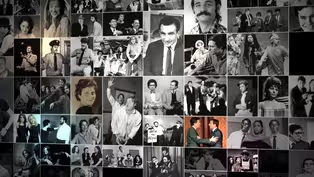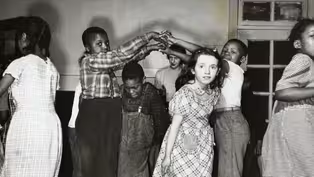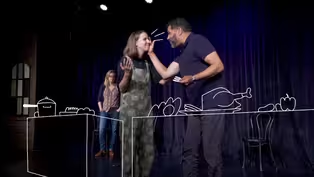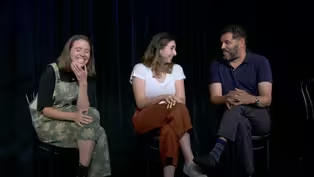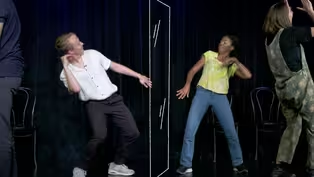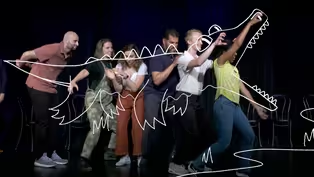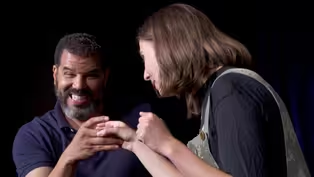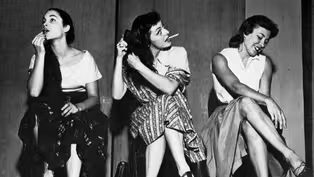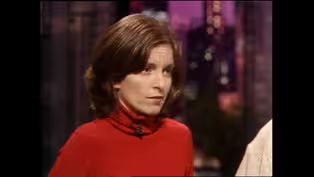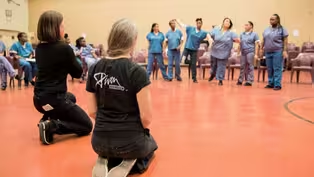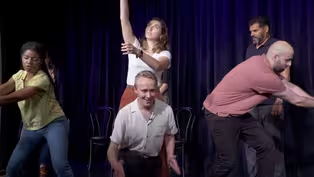Chicago Stories
Inventing Improv: A Chicago Stories Special
10/22/2021 | 59m 32sVideo has Closed Captions
Improv is Chicago’s greatest export, all started with a woman named Viola Spolin.
Chicago’s greatest cultural export just might be improvised theater, which was born at Jane Addams’ Hull House during the Great Depression and carried out into the world by the likes of Bill Murray, Tina Fey, Amy Poehler, and Stephen Colbert. But while to most people improv might seem synonymous with comedy, the art form was devised by a woman named Viola Spolin who wasn’t out for laughs.
Problems playing video? | Closed Captioning Feedback
Problems playing video? | Closed Captioning Feedback
Chicago Stories is a local public television program presented by WTTW
Lead support for CHICAGO STORIES is provided by The Negaunee Foundation. Major support is provided by the Abra Prentice Foundation, Inc. and the TAWANI Foundation.
Chicago Stories
Inventing Improv: A Chicago Stories Special
10/22/2021 | 59m 32sVideo has Closed Captions
Chicago’s greatest cultural export just might be improvised theater, which was born at Jane Addams’ Hull House during the Great Depression and carried out into the world by the likes of Bill Murray, Tina Fey, Amy Poehler, and Stephen Colbert. But while to most people improv might seem synonymous with comedy, the art form was devised by a woman named Viola Spolin who wasn’t out for laughs.
Problems playing video? | Closed Captioning Feedback
How to Watch Chicago Stories
Chicago Stories is available to stream on pbs.org and the free PBS App, available on iPhone, Apple TV, Android TV, Android smartphones, Amazon Fire TV, Amazon Fire Tablet, Roku, Samsung Smart TV, and Vizio.

Chicago Stories - New Season!
Blizzards that brought Chicago to a standstill. A shocking unsolved murder case. A governor's fall from power. Iconic local foods. And the magic of Marshall Field's legendary holiday windows.Providing Support for PBS.org
Learn Moreabout PBS online sponsorship(20's style jazz music) - [Narrator] Coming up.
- Good evening ladies and gentleman, and welcome to The The Second City.
- [Announcer] Ladies and gentlemen, welcome to the show.
- [Narrator] It's one of Chicago's greatest exports.
- [Announcer] The Second City!
- This new kind of comedy that hadn't existed before (actor yelling) and it wasn't in New York, it was here in Chicago.
- Just look at the roster of the people that have come out of Second City in television to film, everything.
- [Narrator] But improv wasn't invented by a funny man.
- Viola Spolin is the mother of improvisation.
- Viola's name should be known by everybody.
- I don't care what kind of improvisational cake you're making, at the base of it, the layers, the cake itself is Spolin.
- [Narrator] Viola Spolin laid improv's foundation while working with immigrant children at Chicago's Hull-House.
- Hull-House is ground zero.
It's the big bang for improvisational theater in America.
- [Narrator] From there, the art form catapulted to the international stage.
- This kind of theater that she came up with ended up changing, not only American theater, but film and television.
- At The The Second City at the Groundlings at UCB, all of these improvisational theaters, it really started here, it started with her.
- [Narrator] Inventing Improv next on "Chicago Stories."
(dramatic music) (actors chatting) Chicago is sacred ground for aspiring performers and writers.
They come from all over the world with a dream to make it to the big time.
(upbeat style jazz music) (actor screaming) - If a young actor or director comes to Chicago, I think it's because the work here is considered authentic, it's considered spontaneous, that big things happen here that you're allowed to experiment, it's seen as a stepping stone.
- Yeah, that kid is coming 'cause they wanna be a star, but they're also coming to do the work.
We're gonna pass a clap around the circle.
Point of concentration is just a clap at the exact same time as your partner.
(hands clapping) Queuing your partner, making sure you're in sync with your partner.
(hands clapping) There we go.
To be in the space of an ensemble of the kind that Viola Spolin created.
- All of these games force immediate act, to act, to act.
- [Narrator] Viola Spolin was a social worker, turned theater guru.
She would give birth to a new kind of theater in the 1930s using her innovative theater games.
- One person will go out of the room, and the group decides who this person is.
He returns.
You are to communicate to them who they are without telling them.
They're not to guess.
An wait for who he is to emerge out of the relationship, out of the environment.
- The thing about Viola's work that really impressed me and changed me in many ways, changed me, not just as an actor, changed me as a person.
Viola in her work, put you in contact with another person in a way you don't usually come into contact with people.
You really look at them and you observe what they're going through, which is the beginning of empathy.
- The goal is to be an exact a mirror as you can be.
Make your feet into their feet, make sure that your face is their face.
The games that she created are about the space between people.
I'm gonna take the focus off of myself and I'm gonna put it on the other.
Let the games create ensemble.
And relax.
- [Narrator] And in time, Viola and her games would revolutionize American comedy.
(audience laughing) - Everything that is being done comedically and with improvisation, all of this stuff happened because of Viola.
(gentle music) (people cheering) - [Narrator] America's first improvisers would be new immigrants and Viola Spolin herself was no stranger to the immigrant experience.
- Viola's parents were both Russian Jewish immigrants, and they came to Chicago in the early 1900s.
- [Narrator] Viola's father, Nikolai Constantine Belachaikovsky, fled the violence and persecution of czarist Russia and set sail for America.
- He arrives at Ellis island and the guy sitting behind the desk, he says, "Name," he says, "Constantine Belachaikovsky."
He says, the guy says, "Well, that's a mouthful.
Why don't you come up with something snappier or more American?"
- [Narrator] Constantine had a book by John Stuart Mill in his pocket.
- So he says, "Make it Mill."
He says, "All right, you're Make Mills."
- [Narrator] Make Mills and his wife Sonia settled in Chicago and had Viola and five other children.
- He ended up in Chicago where he became a police officer and eventually joined the Red Squad and became the head of the Red Squad.
(whistle blowing) - The Red Squad was a unit that surveilled local leftist groups, socialists and communists.
Mills was also assigned security detail for the opera house.
Viola would accompany him and watch the performances from backstage.
- She was totally in love with the theater.
She directed her first show at eight years old, she was always putting on shows.
She loved games and she knew a lot of games, but she also came from a family tradition of play.
They would get together and sing songs around the piano.
They would make up operas like three act plays and there were sheets of 10 for sound effects and costumes.
- [Narrator] Viola's nickname was Spark.
And she lived up to the title.
- I feel like Viola just came born, ready to play.
She had a ton of girlfriends and they all hung out together and they were very modern girls.
They would bob their hair and wear red lipstick and men's clothing.
And they all pooled their money to buy an old truck.
They were looking toward the future and not the past because the past was full of trauma, really.
They looked around and saw the challenges to immigrants like their parents and first-generation Americans like them.
And they looked to change it.
- [Narrator] When she was 18 years old, Viola Mills walked into Jane Addam's Hull-House on Chicago's near west side.
- Hull-House was a settlement house founded by the great Jane Addams and Ellen Gates Starr.
And it was at the intersection of a lot of immigrant neighborhoods in Chicago.
There were Greek immigrants, Italian immigrants, Russian immigrants, Mexican immigrants, you name it.
- At the time, this particular neighborhood was one of the most congested neighborhoods in Chicago and maybe even in the country full of terminal housing, lots of dead animals when they died were just left in the streets.
So children were playing in the streets among the trash.
- [Narrator] Hull-House was created to address the problems of urban industrialization and poverty.
- The premise was that in these neglected, dilapidated marginalized communities, you had to actually go live among the people to make a change in their lives.
- [Narrator] Hull-House would provide kindergarten and childcare services for working parents.
There was a wellness clinic, language and citizenship classes and music, art, and theater classes.
- They had a strong belief that democracy required an educated citizenry, and that all people deserved an education.
And that included the arts.
- [Narrator] Viola was here to work.
She had enrolled in a recreation training school run by a sociologist named Neva Boyd.
Neva was studying the educational and social benefits of imaginative play.
- Neva Boyd was fascinated with children's games.
And her whole thing was to observe how children create games and by playing games, what is negotiated?
How did children arrange themselves?
How they decide who's gonna be doing what and how were rules established?
- [Narrator] Neva was training Viola and others in group work, what we would now call social work.
- And so her method of teaching a young group workers was to teach them every game known to humankind.
They learned not just games, but folk dancing and storytelling and singing.
- [Narrator] And there was no one better suited for this work than Viola.
Neva Boyd told her that she had never met another adult who knew so many games.
- Would you like to play one more quick running game before you go?
- [Students] Yeah!
- Get rid of a lot of energy?
Well, we'll play "Steal The Bacon".
You know how to play that?
- Yeah, yeah.
- All right, count off in two.
- [Students] One, two.
- Neva Boyd said "When we're playing all the other stuff, we're worried about all our self-consciousness disappears because we're focused on the rules of the game, on each other, we're in the present time when we play.
(people cheering) And so this is where Viola understood that play could be a great technique for teaching theater.
(students laughing) Viola worked with Neva Boyd for three years until she got married and had Paul at a very young age.
- [Narrator] Viola's husband was her high school sweetheart, Wilmer Sills, they had two children, Paul and William Sills.
Paul would grow up to co-found The Second City.
- After Viola had Paul, she was not able to work as a group worker.
And so she would have all her girlfriends over to her apartment and they would play games.
So Paul would be propped up on the bed, watching all these hilarious young women.
And Viola said that's where she felt the roots of Second City came from with, from the baby watching the games on the bed.
(engine running) - [Narrator] Wilmer and Viola's marriage didn't last.
And she found herself a single mother of two young boys, Viola, along with other divorced moms pooled their money and rented a mansion on Sheridan Road to live in and raise their children communally.
It was the depression and a single mother alone could not manage the cost, but a community of moms could.
- They called it The Educational Playroom.
It was such an important period in their lives because they got to live in this communal way with a bunch of kids.
I mean, what could be more fun, but the mothers also really had a chance to feel safe about what was happening with their kids and who was taking care of them.
- [Narrator] Knowing that her children were cared for, Viola finally got to focus on her dream of a life in the theater.
- She went out and got herself theater training in any way she could.
She went to DePaul's night school.
She worked as a stage manager at the World's Fair.
She went to New York to study with the group theater, but she was away from her boys and that was really painful for her.
So she came back.
(upbeat orchestral music) - [Narrator] On Neva Boyd's recommendation, Viola soon got the job of trauma supervisor for the WPA at Hull-House.
Viola could now completely focus on developing a form of theater training that incorporated play.
- She was working with a lot of neighborhood kids who were immigrants and first-generation.
So she was working with a lot of people who didn't all necessarily share the same language.
She knew from working with Neva Boyd that experiential education is what works.
And so anytime she had a problem communicating a problem of the theater to her players, she would create a game so that they would learn through doing, they would learn through experience.
- My favorite example is that she was working on what was supposed to be sort of a romantic scene between a couple of teenagers and they were very self-conscious and their body language was very, you know, well that doesn't look too good.
And so she invents a game called "Contact".
- Could you hand me that glass?
- [Jeffrey] The idea of "Contact" is that for every line you have with to another person, you have to make organic, logical, physical contact with them.
- Taste this, tell me if it's dried.
- [Jeffrey] So they stopped thinking about how shy and inhibited they were.
And their point of concentration came to be- - It's dry.
- how can I cleverly respond to the challenge of the game to make physical contact with the other person in the scene?
- I'm pregnant.
(people laughing) (man gasps) - Oh!
Oh!
Hello!
- No, no, no, no, no, no.
- And they would do things.
And she would say, "Oh, that's wonderful.
That's gotta be in the final show."
- Not in like a yay way.
- And so the show would be made up of a collection of the moments that they had come up with in response to her games, to her challenges.
- Which makes sense to you- - [Jeffrey] And they felt empowered by this and respected.
(actors speaking gibberish) - [Narrator] The game, "Gibberish Interpreter", made the players communicate physically to show, not tell which comes in handy when the players may speak different languages.
- The important part about pizza is making sure you get the dough just right.
- Gibberish is great.
It just forces you to look into people's eyes and to pick up what their body language is saying.
'Cause you're, you are saying something.
but it's in the language that you just made up.
(actors speaking gibberish) - To me pizza is all about the spit.
- Can we have an opening line for the scene?
- [Woman] Could you say, octopus are on sale?
- Octopi are on sale.
- [Narrator] Audience Suggestion, the most famous technique of improvisation was also first used by Viola's students at Hull-House.
- Octopuses are on sale, Kathleen.
- I didn't know that's what they were called.
- It might not- - Hull-House is ground zero.
It's the big bang for improvisational theater in America.
Some of these like neighborhood Hull-House kids were the very first performing improvisers in the United States.
- [Narrator] Viola directed a show at Hull-House titled "Halsted Street" that took place on a trolley car.
Every scene was a different stop on the Halsted street line and every stop was a chance to tell a different story.
- The beauty of this play was it was meant to kind of celebrate the neighborhood and its diversity of people.
Each of the different ethnic populations got a voice in this play.
- [Narrator] The Chicago press began to report on the new works coming out of Hull-House.
- [Reporter] I certainly saw something.
There were about 150 people in the cast, Italians, Greeks, Mexicans, Negroes and I don't know what other racial strains.
They were of all ages and of both sexes.
What they were doing was not exactly a play.
It was perhaps what is called in the trade, a revue, but it's form does not matter.
The important thing about it was that it was conceived, written and played by the people themselves.
Few will ever see this play.
And I doubt if any professional critical even hear of it, yet for importance I think it is worth about a dozen Broadway successes rolled into one.
- It's so wonderful that someone was there to note that because it really is something new that Viola did.
Her work early on was democratizing the process of theater making by allowing the participants to do it all.
- [Narrator] And Viola's son, Paul, the future Cole creator of The The Second City was right in the middle of it all.
Viola met, fell in love and married Ed Spolin whose craft for the WPA was carpentry and set design.
During the second World War Ed served on a Red Cross ship in the Aleutian islands and Viola moved her boys to San Francisco.
- She worked as a Rosie, the Riveter for a while.
She worked in the shipyards in Oakland when they allowed women to do that, but they didn't live in San Francisco long.
The boys didn't like it.
They moved to Los Angeles where she had Chicago friends.
- [Narrator] After the War, Viola and Ed took the money he had won in a poker game on the ship back home and bought a house in the Hollywood Hills.
(gentle music) Viola soon started teaching her theater workshops and in 1948, she established the Young Actors Company.
- [Aretha] And in fact, several of the children who she worked with became professional actors, including Alan Arkin and Paul Sand.
- My mom called UCLA, I guess theater department and said, "Who's a good teacher for children who will keep them from going crazy?"
Anyway, it turns out she found Viola Spolin.
- [Narrator] Viola's students were steeped in her methods and she continued to build upon and refine her games.
- You don't worry about doing right or wrong.
You just fly with it, you know?
She had a makeup person to teach us makeup.
I was in "A Clown Who Ran Away."
I was the clown and it just became home.
I was raised by a Viola as much as by my mom and dad in a way.
She had a green convertible and a green sarong and very suntanned, had a cigarette and her laugh.
She had the most, I'm getting moved, I'm sorry.
Isn't it funny?
Great, a great laugh, encouraging.
- [Narrator] While Viola was busy with the Young Actors Company, her son, Paul had hitchhiked back to Chicago to finish high school at Francis Parker.
After serving in the merchant Marines and the army, a 20-year-old Paul Sills used his GI bill to enroll at the University of Chicago.
He was admitted under the Hutchins Plan, which allowed any student who could pass a rigorous entrance exam regardless of age.
- The University of Chicago was a remarkable place, it was a remarkable time.
You've got these brilliant, like 40-year-olds in college, you know, but as important are all the soldiers who are now like coming back hungry for education and have so much more life experience and drama.
- The University of Chicago also had the reputation of having a lot of Marxist sympathizers to the point where it had the nickname Red U, which I'm sure made the trustees just really happy.
- So Paul landing at University of Chicago was this great gift because it was just really fertile soil, but they didn't have a theater department.
And Paul was singularly driven to be in the theater.
- [Narrator] So Paul started offering workshops in Viola's games, free of charge.
He plastered the campus with signs inviting anyone interested to come play.
Paul's flyers attracted a who's who of future greats to learn Viola's games.
- One of them is Ed Asner, Barbara Harris, Mike Nichols, and Elaine May started there.
Joyce Piven, Byrne Piven, Susan Sontag did some plays with them.
So with help from some money from David Shepherd who had just arrived in town, they created this company.
- [Narrator] David Shepherd had hitchhiked to Chicago with a $10,000 inheritance and a dream of his own.
- David had been in New York and very interested in theater, but bored out of his mind and aggravated with the type of theater that was being done.
And what he really wanted to do is start like a theater that would attract the workers.
And that would address the problems of the workers.
- David Shepherd was the Marxist son of a millionaire, which sets up a little bit of tension and he loved the theater and he believed that you were impoverished if you didn't have theater.
- So he hitchhiked into the big west 'cause he thought that's where the real America was and where does he end up but at the University of Chicago where somebody said, you've gotta meet this guy, Paul sills.
- [Narrator] David told Paul of his idea for a theater for the common man, borrowing from the centuries old Commedia dell'arte.
(medieval music) During the Renaissance, a troop of players would travel from town to town performing shows.
There were no scripts, just loose farcical scenarios, featuring exaggerated characters, Like servants, the town drunk, corrupt politicians.
- David Shepherd had the idea of a popular theater that would be in Gary Indiana and the people would come and see stories and things that reflected their life, and they would like this.
- [Narrator] Paul offered David a deal.
He would help David with his modern commedia later, but first David would front the money for Paul's idea.
With David's inheritance, they'd opened one of Chicago's first storefront theaters in an old Chinese restaurant.
- And they fashioned a theater out of that.
And there were still the booths there where people would eat, you know, and they were very separated and those became people's makeshift apartments.
A lot of people, just a lot of them just slept there.
- [Narrator] The city's fire codes wouldn't allow for a storefront theater.
The company had a clever solution.
- We call ourselves Playwrights Theater Club, but we had to be a club by the way, and not an open theater because of legal problems.
There was no way to be a theater because that you didn't pass code, building code and the other things.
So you had to be a club.
And so people had to join the club and for the price of the ticket and get a card.
And I don't know what.
- [Narrator] This wasn't going to be improvised theater.
But Paul would use the tools of improvisation to create a new gritty style of theater that Chicago would become famous for.
- They brought Viola in to play theater games with them and Elaine May and everyone worked with her for a very long time.
- Okay, who's it?
He's coming for me.
(students yelling) - Everything Viola taught you to do was moving you away from your intellect and into your instinct.
So that's what these games do, they free you up and it immediately puts you in a state of readiness and excitement of anticipation.
It's a perfect way to be on stage.
- Playwrights Theater Club opened to rave reviews on June 23rd, 1953 with Brecht's "The Caucasian Chalk Circle."
This would be the first of an ambitious schedule of two dozen plays in two years.
They performed a mix of classics with some original works written by Paul Sills, David Shepherd, and Elaine May.
By the end of their first year, their storefront theater had 2000 subscribers and critical acclaim.
- They got a reputation as a very high energy company, not just rehash old plays from New York, but a real drive to create a Chicago theater, to create something new here.
- [Narrator] But the fever pace of production began to take a toll on the players and many left to try their luck in New York.
And then the fire department shut down the so-called club for code violations.
It was time for Paul Sills to hold up his end of the bargain to help David Shepherd with his theater for the common man.
- The audience was to be reflected in the material and by looking at representations of themselves on the stage, they would gain self knowledge and would be empowered to break off the shackles that imprisoned them and rise up and overthrown the whole rotten system.
- [Narrator] Like a compass, his Compass Players would help the audience discover where they were and it would be the first of its kind.
- Compass is considered the first improvisational theater company in the United States.
- One, two, three.
- Once again, they called in Viola Spolin to run improv workshops for the new cast.
- You don't motivate anything, you integrate it.
Motivate, again, is just you giving a reason for something, there's always a reason, but when you're forced to integrate, you're forced into the environment again.
- Actors were going to be in a situation where they were gonna be coming up with their own material.
And that's what a lot of Viola's work was about, was how do you share a space?
How do you jointly create a metaphor?
So she was absolutely necessary to train people.
- [Narrator] Some of the compass cast were familiar with Viola's games like Mike Nichols and Elaine May, others were new to this style of working.
- Viola'd come in and see the sort of mess and say, "Okay, I'm going to clarify this mess by having you play this game."
And to be fair, I don't know that they were all 100% on board.
I think for a lot of them, it was like, oh, okay.
Yeah, this is, this is Paul's mom, and she's gonna do this thing.
And do we really wanna do this?
Allow yourself to explore painting this wall.
Many of them would say, well, you know, I, I wasn't sure.
And then suddenly we got into a moment and I realized, no, this is brilliant.
This is the piece of this work that I had been missing my whole life.
- [Narrator] On July 5th, 1955, the Compass Players made their debut.
- Hello, I'm David Shepherd and welcome to The Compass.
Everything you're going to see tonight is completely original, never before seen or performed.
So grab a Michelob and enjoy the show.
- They would start with a living newspaper.
- [Actor] 16 were injured in collapse of bleachers.
- [Anne] Short joke based scenes based on that day's news.
- [Actor] A bleacher section collapsed here tonight, spilling fireworks and carnival tent shows spectators into a field.
- [Actors] Ooh.
Ah.
(actors yelling) (audience laughing) - [Anne] The second part of the Compass show was a scenario play.
- And now for the game of hurt.
- One of the writers would come up with a structure and then the scenes within that scenario play would be improvised.
And then they would take suggestions from the audience.
- How about a political figure?
Current political figure.
- [Audience Member] Oh, President Eisenhower.
- President Eisenhower, great.
- [Attendee] Mayor Daley.
- Mayor Daley.
Fantastic.
Thank you.
- And they would come back and improvise those scenes as well as play the games.
- [Narrator] The Compass Players were an instant success.
- It was right near the University of Chicago campus and the professors were coming and the students were coming and the audience was made of really intelligent hip people.
They'd never seen anything like it.
And they were thrilled by it.
- They were creating a theater for the people.
What they didn't really think they were doing, was creating comedy.
- It was about truth.
And now these people were funny.
So comedy was gonna happen no matter what.
But sometimes the subjects were very, very serious.
- They did a piece that was based on this private who Eisenhower had shot for cowardice during World War II.
Not many laughs in that.
(phone ringing) - [Narrator] Each scenario was in some ways exploration of the American value system.
- Hello?
- Hello, Herman.
- Marianne, Marianne, please come home.
- [Narrator] In "The Game Of Hurt" written by Paul Sills, a husband sells his wife to a steelworker at a bar and selfishly tries to win her back.
- [Actor] Marianne, I haven't had dinner in a week.
I don't know how to cook.
I miss you.
- [Marianne] I'm so sorry- - The scenarios dealt with the hypocrisy of mass culture.
- [Actor] What can I do to win you back?
- [Narrator] Exposing the ugly side of consumerism and nationalism.
- [Actor] And I'm gonna win you back, okay?
- No one was doing that.
To speak about the needs of the people to be non-conformist was foreboding.
- [Presenter] It's a bomb, duck and cover.
Were you a member of the Congress part?
- [Reporter] Soviets are now the unquestionable leaders in the race for space.
(water streaming) - Hold that, boycott.
Boycott.
(woman screaming) - Everybody had sort of survived this, you know, one, two trauma punch of the Great Depression and World War II and so everyone was like, "No, no everything's okay, everything's okay," and the Compass Players were onstage hearing the audience say, "We're not okay," and they were repeating back to them.
"Look, here are the ways in which we're not okay."
- Can I offer you a cigarette?
- Oh yes, please.
Oh.
(actor cries) - Now giving away cigarettes for free would be communism, wouldn't it?
Somebody offers you a cigarette, you say I'm paying for it like an American.
- Operator, how may connect your call?
- [Narrator] Compass was so popular that they relocated two times, to larger spaces with more seating.
- Maybe you wanna reunify Germany?
- What was that?
You were breaking up.
(actor imitates static connection) - No, this is a good connection.
- Uh-oh, reunify Germany.
- [Narrator] But once again, the grind of creating a new show every week was beginning to wear the cast out.
- This dress is a catastrophe.
- [Narrator] They started repeating pieces that worked instead of improvising every time.
And the long involved scenarios were set aside.
- David Shepherd was again, very disappointed that his vision did not come out to be what he wanted it to be.
- [Narrator] Susan Shepherd closed Compass in January, 1957.
- Compass Players like Playwrights Theater Club before it only lasted two years.
But again, that two years has changed everything because out of that then we got Second City and that became a game changer.
- [Narrator] Paul Sills was managing a nightclub.
He wanted to open a new cabaret.
So Bernie Sahlins and Howard Alk joined Sills as partners and converted what had been a Chinese laundry into a small theater.
- So they had to come up with a new name and they were thinking about this really nasty article that A.J.
Liebling had written about how Chicago was devoid of culture.
It was called The Second City and it was meant to be an insulting term.
That insult gave birth to the names of The Second City.
This was Sills's way of lifting a finger to Liebling and within that is the sort of defiance that was part of that theater.
- [Narrator] Paul got many from the Compass gang back together and began running workshops, using Viola's games to build another community of players.
(audience chattering) On December 16th, 1959, The Second City opened his doors to a packed house.
- It's this tiny cabaret, the entire audience is all sitting in chairs.
They're all decked out in supper club outfits.
They're drinking, they're smoking.
And then, (dramatic music) there's Barbara Harris in a cocktail dress singing.
♪ Oh, the Lord above me ♪ ♪ See me cry ♪ ♪ He's gotta love me ♪ ♪ But I don't know why ♪ ♪ A woman's got one thing ♪ ♪ She'd better not lose ♪ ♪ What's that, baby, she's got blues ♪ - [Narrator] The cast included a few of Viola's former students.
- Hello God.
- [Narrator] Including Alan Arkin.
- God, it's me Noah.
- [Narrator] And Paul Sand.
(upbeat piano music) - They were all so smart of this company of actors of The Second City, they all went to the University of Chicago and they knew everything that was going on in every area, politics and science, et cetera.
And I knew nothing, I didn't, you know, I don't know what I knew, but it wasn't that.
So I just was afraid to talk.
- Yeah, you got him?
- For sure, not bad.
- I'm sure they're not.
(man yelling) ♪ New wine for old bottles ♪ ♪ New lines on the old jars ♪ - There were songs, and there were scenes and then there were improvisations at the end.
So it was very much inspired by Compass.
And yet it was different because the scenes were set.
They were found through improvisation and developed.
- This is what we're gonna be playing with that is the all American football.
- That's an odd shape, isn't it?
- Yeah.
- Yes, it's not actually wrong.
- No, that's so you can pass and kick it.
- Many of them were very, very funny.
Like football comes to University of Chicago.
They were making fun of themselves.
- Now, Pam just come over here.
Put your hands like this, give me your hands here and put 'em up under there and get the ball from Dragwarn and give it off the Marders here.
- All right, let's see if that works.
Play off here.
All right, here we go.
Say, go on out there.
Body contact, a little body contact right in there, come on, right up here.
Go on, get that ball.
Get that ball, come on, get in there.
Come on, the ball, son, get in there, get that ball.
Oh.
(audience laughing) What's the matter with you?
What's wrong?
- I won't do it.
- Why not?
- Because I hardly know him.
(audience laughing) - They also had quieter scenes that were about relationships between people.
- It turns out, you see, that it takes years to learn how to love.
- And what did you do?
- Well, father, wait.
Now I haven't finished, it's like carpentry, your medicine, it's an art.
- Yeah, it's like carpentry and medicine.
- And all those songs on the radio, you know, the instant I saw you, I felt- - Yes, yes, so what happened?
You read the book and then you did a little field work.
(audience laughing) I'm trying to ask you if you made love with Fred, there.
- Well, that's what I'm trying to tell you.
That's a semantic argument.
- It is not a semantic argument.
It's a question of mechanics that I'm asking.
(audience laughing) - Very intelligent comedy, addressing the concerns of the day.
- Oh, oh, freedom, freedom, freedom.
Oh, oh, rebellion, rebellion, rebellion.
I didn't know I was so angry.
- Come on, you got it, that's good, come on.
- It's rebellious, shake up everything, and it was a way of thumbing your nose at the culture.
- Say, I can't make head nor tail out of this modern novel.
- You find the heroes dull, the heroines lack sex appeal, nothing ever seems to turn out right in the end?
Well, why not change to Ernest Hemingway.
- Who?
- Ernest Hemingway.
- But isn't he harsh on soft and tender minds?
- Oh, not a bit.
Hear what prominent clergymen, Norman Vincent Peale has to say.
"Modern theological science tells us we ought to be receptive to new ideas.
Only in this way can we hope to destroy them."
- I think I'll try it.
- Available- - The material that they were doing at Second City was always very topical.
So it wasn't always going for the laughs.
It was going for, what's an authentic moment between these two characters.
And then out of that comes the humor.
- Hey, squeezer!
(actor speaking in foreign language) (both singing in foreign language) - We had a lotta laugh, people in the audience was laughing all the time, but there wasn't one joke.
(audience laughing) We really, actors, improvisers are really like mirrors in a way, you know, taught to be an honest mirror.
And I think the laugh comes from the recognition of oneself.
(actors heaving) - No, no, no, no, no, no, no!
- Et tu Bruto.
(audience laughing) - [Narrator] The scenes would reflect cultural hypocrisy, greed and consumerism, but also isolation and loneliness.
- It was a man sitting across from me on the bus and he was reading, "How To Win Friends And Influence People."
And I thought that was very moving that somebody would do that and not put a brown paper bag over it or something.
You know what I mean?
So that night, one of the suggestions from the audience was a phonograph record.
So I decided that I'll be a guy that buys a phonograph record called, "How To Win A Friend."
So I take the record out of the thing, turn onto one, put it on and then just sort of click it and I'd pick up the needle and do that.
And Eugene would go.
(imitating needle flowing) (Eugene imitating needle flowing) - [Frank] Hi.
So, you wanna win a friend, huh?
Well, what seems to be the trouble?
- Oh, well, I don't know anybody over here.
- [Frank] Well, we can fix that.
Now first you have to show an interest in others.
You have to let them know you like them.
How are you?
- Oh, I'm fine.
How are you> - Fine.
What's your name?
- Harry.
- That's a fine name.
- What's yours?
- Frank Watkin.
- How you doing Mr. Watkin?
- [Frank] Call me Frank.
Now, where do you work?
- Oh, I work on, at Webolt, I deliver packages.
- [Frank] That's a fine job, I'll bet you like that.
- No, I don't really, no.
- I bet you like to feel responsible and help the other fellow out.
- I have no responsibility.
- You know something?
You're really on your way up in that job.
- No, it's a rotten kind of a job.
I don't like it.
- [Frank] You have a girl?
- Nah.
- [Frank] Yes you do.
- No, I don't.
- [Frank] Yes you do.
- No, I don't.
- [Frank] You're not making the most out of your opportunities, you know that, fella?
- What do you mean?
- Why there's a girl down at work who has her eye on you and you don't even know it.
- You're crazy.
You don't know.
- [Frank] What do you do in your spare time?
- Well, let's see.
I do a lot of things.
- [Frank] That's a good way to spend your spare time.
- No, no, listen.
I go down to the movie.
That's one thing I do.
He tried to with certain questions, tried to bring me out to a sing a song, tell a joke.
- [Frank] ave a drink, fella.
- Yeah.
- Hey, remember when we were kids, remember the fun we used to have?
We'd race all around town on our bikes and all.
- Yeah, I remember and I always used to lose my skate key and I had to use yours.
- [Frank] Yeah, I remember her, all right.
- What?
(Frank laughs) - [Frank] Have another drink, relax, sit down.
Hey, it's nice to feel you can trust someone, isn't it?
- It's great.
- Listen to me.
I want you to know that I'm gonna be your friend to the end.
- I appreciate it.
- The end.
(record scratching) The end.
The end.
- The needle gets caught in the groove and repeats it and repeats it.
Then you realize it's just a record.
This is, I don't have a friend and you know, I'll move on.
- All these people have seen nightclub acts before.
What they haven't seen is this.
- We will need some suggestions from you in the audience.
First of all, we'd like you to suggest a character, the kind of person, occupation or walk of life.
- A peanut vendor.
- A peanut vendor, thank you, can we have another character?
- This new kind of comedy, this new kind of club- - A mortician, a mortician- - that hadn't existed before and it wasn't in New York.
It was here in Chicago.
(rhythmic thumping) - The lines were out the door.
The cast lived off coffee and cigarettes.
And the rush they felt from the audience.
(rhythmic thumping continues) - I loved it, yeah.
You constantly sort of feel like you're on something.
(rhythmic clapping) (audience laughing) - They would write all the time.
They had rehearsals every day.
In addition to three shows a night, they had rehearsals every day of the week and they were constantly generating new material.
- Hey, what are you?
- I am a chicken too, captain Noah.
This is my wife.
Please, captain, can we please get on the boat?
- [Narrator] Alan Arkin said the cast had a kind of synergistic perfection.
- Oh, I'm going to have trouble with that one.
- [Narrator] But it was still a boys club.
- There were two women in the company as opposed to four or five guys.
I said, "Well, how did, how did that work?"
And mine are rather dry and Lee said, "Well, if you had an idea, you had to make the guys think it was their idea."
She said, "I got real good at that."
(Jeffrey laughs) - [Narrator] Their director, Paul Sills could be tough.
He urged the actors to commit to the truth rather than playing for laughs.
- He was a stickler for the truth.
When he was working with the actors, he would kinda turn into this other person, he'd just lose it.
Paul would like throw you on the ground and saying, "That's a joke?
You're telling a joke?
There's no jokes here."
- "Don't pretend to be human.
Be human, "he'd tell us, you know, and it's like, wait, how do I do that when you're watching me?
Oh, well that's, that's where the games come in.
- Professor?
(upbeat piano music) - [Narrator] The audience just knew it was funny.
And soon a national buzz began to build around this new form of theater.
- People were coming from everywhere, all sorts of celebrities were even coming on just to see it.
- See, Gerhard, I told you, you could play Bach in a nightclub and people will listen, ja.
(audience laughing) - It took off in and it instantly got some attention.
Remember Gene Troobnick was by day working as an editor at "Playboy".
So he got an article into "Playboy", which automatically in those days made it hip.
And so it began to get a national reputation.
- [Narrator] Producers, agents, and record companies came calling.
Second City was dubbed a temple of satire and its players sat at the throne.
(upbeat orchestral music) - We didn't know we were the greatest satirists in America.
We didn't know that, some reporter wrote it, you know, that's all, and it's we weren't, but that's, that's how they treated us.
- [Narrator] The Second City had a successful run in Los Angeles and ended up on Broadway, eventually adding a New York cast that included Alan Alda.
- Paul Sills invited me to the part of a workshop.
And we did that for about six months.
I found out if I use the principles of improv that I had learned in Viola's workshop, I was a better actor.
I made better contact with the people I was working with.
- [Narrator] Viola Spolin, now in her 50s, became an essential part of the company.
- As the theater took off, she had to develop this initial training center in order for Second City of cast members.
- [Narrator] Viola poured herself into the work of training the cast, but she was also hard at work on what would prove to be her most enduring contribution to American culture.
In 1963, she published "Improvisation For The Theater", a groundbreaking book that laid out Viola's philosophy and teaching system.
- The book was immediately received all across the country.
People were using it right off the bat.
So it launched a million improvisational theater companies, but it also went into the educational system and really changed the way people thought about teaching acting.
- [Narrator] Viola published more than 200 games breaking down the craft of acting into manageable parts.
- Each game focuses on a very specific skill set and you learn that skillset improvisationally, and it could be something like object work.
- [Teacher] The more you build this object, the more real it becomes to.
- [Jen] It's a ball.
It's a cylinder.
It's a problem with that object.
- [Teacher] Make discoveries about it as you're having difficulty with it.
- It might be sound and movement work, it might be character work, it might be story work.
Each game allows you to navigate the world of the imagination.
- Freeze.
- You're navigating the who, the what, the where, the how, the story, the conflict.
- Really feel that substance, good, now transform it.
- Freeze.
- The games allows you to turn down, you don't turn it off, but using that point of concentration turns down the judging part of your brain.
And it allows and frees up the creative and intuitive piece of your brain to do something different.
- Theater games bring you very close to your subconscious self.
And it's a way of understanding and being with each other that becomes, it's not psychic, but it is very involved with your psyche.
- Explore and heighten, looking at each other.
- What most people who are tasked with improvising, they start thinking.
- Explore and heighten feeling really awkward with each other.
- But what Spolin taught was if we get your body involved and get your body to distract the mind, what it allows the mind to do is be free and present to be able to receive what's happening in the moment.
And there you are.
And then you're flying.
- And scene.
Good, well done.
(all laughing) - [Narrator] Viola said.
- [Viola Voiceover] My games are more than a bunch of exercises.
Used properly, they're a learning system which can reach the intuitive power of the individual and release genius.
- [Narrator] And sure enough, Viola laid the foundation for a creative explosion.
- Ed Asner, Alan Alda, Alan Arkin, Aykroyd, Belushi, John Candy, all the SCTV people, boom, boom, boom, boom, boom.
And just look at the roster of the people that have come out of Second City.
And that is how massive the change in comedy has been in television, in film, everything.
I first came to Second City to better present my commercials at Leo Burnett.
And I just, I lived for Thursdays and Saturdays when I had those classes and was just like, this is what I wanted.
There's no money in it, but this is what I wanna do for the rest of my life.
- The first time I auditioned, I'd been beat up in a bar the night before, I was a little puffy.
(George laughs) I thought, oh fuck, I blew that.
And then a few weeks later an entire touring company flaked.
So they had to replace like six or seven people at one time.
And so that time I got in, it was fun.
It was a blast.
- I thought that I was going to go and learn how to be a standup like Eddie Murphy.
- Yeah.
- That was my understanding of what Second City was, was comedy, comedy, you're a stand up.
And I went there the first time and had the first class and it was all foundational Viola Spolin.
I came back home and I said, "I know what I wanna do for the rest of my life."
- I got into The Second City because I knew even as a kid that they went on to, you know, "Saturday Night Live," that these were, that's where the funny came from.
And so I auditioned and in order to prepare for the auditions, I read about Spolin, I read her book, I got the cards, I got the box, the cards with all the exercises.
(audience laughing) - People, listen up, this is fairly important.
When faced with a crisis in your life and wondering whether you can overcome it, you must remember these two simple words.
Na-ah.
(audience laughing) - Everyone says, "Why is everyone from Second City so successful, really successful people?
And there's several reasons, but one of them might be just flat out experienced.
- Dad, Kevin mutilated my Barbies again.
- This sounds pompous, but we definitely have a lot of experience at figuring out how to make shit work.
- No means no, G.I.
Joe.
- Eight shows a week, 52 weeks a year, you know, nobody in Chicago at least got that kind of, it's, nobody in New York, fuck that, nobody anywhere got that kind of experience.
(audience laughing) - I came for the improvisation and I stayed for the movement.
When I learned really who Viola Spolin was and that this was the people's work, as a African-American girl at that time and as a woman now, this work has always spoken to me.
- The biggest lesson I think of swollen for me is ensemble.
If you start with the basic that we all we're an ensemble, we owe each other respect and love, and we're here to work together.
Do you know how much garbage you've just gotten rid of without, you've just gotten rid of gender.
You've just gotten rid of class.
You've just gotten rid of ethnicity and religion.
You've gotten rid of all of it without anybody feeling disrespected or devalued.
That to me was the amazing thing.
Like here's a chance for me to go perform and act and do this thing that I love to do where I'm not quite frankly playing the same character over and over and over again and I get to be whoever I want.
Hallelujah!
(hands clapping) And people are supposed to a yes and the choice.
- [Frances] That's right.
- Not tell me who I'm going to be.
- Yes, Mrs. President.
- That's what I'm saying.
And thank you, Mrs.
Vice-president.
(Frances chuckling) - [Narrator] The seeds Viola planted at Hull-House would forever change the theatrical landscape and her work would find new audiences and new ways to connect community.
- Viola's work paves the way for so much more that you can do with improv, other than entertainment.
Hello, everybody, hi.
How are you?
Corporations use it, hospitals use it.
Over the years, we've taught 15,000 scientists and doctors.
Okay, it's a balloon now.
To communicate better and everybody starts with exercises that are raced on Viola's.
- [Both] And learned about vlogs.
(all laughing) - When she laughs, she's not laughing.
- Oh.
(all laughing) - These games work with everyone.
We have been working with adults with disabilities, primarily neuro-diverse adults for the last 15 years.
And we have a program with Cooke County jail.
We work with incarcerated women.
What we've seen in this program is women are building empathy skills.
Women are being supported socially and emotionally through these games in a way that I am inspired by.
- The focus is- - follow the follower.
- That's the same focus as in transformation.
Let's try just a little of transformation.
- [Narrator] Viola Spolin would continue to write and teach until shortly before her death in 1994.
- Change.
Finish it.
- [Narrator] And her son Paul would carry the torch through the next decade.
- That's right.
You gotta get a full body in.
All right now transforms.
(gentle music) - Sometimes people want to pit them against each other.
Well, who was the real genius between the two of them?
Well, if you believe Viola, we all are a genius, right?
If we let it.
He was the greatest devotee of his mother's work.
He put her up there with Shakespeare.
He really believed that she had a teaching that would outlast us all.
- Viola made ripples in a pond that had tsunami affects.
And I think in some ways we see the tsunami that is Second City.
And we celebrate these amazing well-known artists, but we often forget that there was a woman at the signup who created the tools for this great change.
- I don't care what kind of improvisational cake you're making.
At the base of it, the layers, the cake itself is Spolin.
That's it, I don't care what kind of Fonda you do.
I don't care if you're doing comedy sports.
It's all Spolin.
- Now take this ball and just play with it.
Now give the ball its time in space.
- Viola understood there's no limit to where this can go because it's about getting people together and transcending your own limits.
- You're working with the invisible, the magical invisible, that's where the intuition is.
- She helped us connect with one another and with ourselves too, and with our own humanity, through these games, that ability to strip things away and find our humanity in one another's humanity and our spontaneity and our genius.
That's a hell of a legacy.
The Artists that Grew in Chicago
Video has Closed Captions
Clip: 10/22/2021 | 4m 23s | Many actors and comedians got their start in the Chicago comedy scene. (4m 23s)
Hull House and the Origins of Improvisation
Video has Closed Captions
Clip: 10/22/2021 | 6m 7s | The origins of improv comedy are at Chicago’s Hull House in the early 20th century. (6m 7s)
Improv Game Demonstration: Contact
Video has Closed Captions
Clip: 10/22/2021 | 2m 21s | Improvisers demonstrate a Viola Spolin game called Contact at The Second City. (2m 21s)
Improv Game Demonstration: Gibberish Interpreter
Video has Closed Captions
Clip: 10/22/2021 | 2m 25s | Improvisers demonstrate a Viola Spolin game, Gibberish Interpreter, at The Second City. (2m 25s)
Improv Game Demonstration: Mirror
Video has Closed Captions
Clip: 10/22/2021 | 2m 18s | Improvisers demonstrate a Viola Spolin game called Mirror at The Second City. (2m 18s)
Improv Game Demonstration: Parts of a Whole
Video has Closed Captions
Clip: 10/22/2021 | 1m 42s | Improvisers demonstrate a Viola Spolin game called Parts of a Whole at The Second City. (1m 42s)
Improv Game Demonstration: Spacewalk
Video has Closed Captions
Clip: 10/22/2021 | 2m 26s | Improvisers demonstrate a Viola Spolin game called Spacewalk at The Second City. (2m 26s)
Inventing Improv: A Chicago Stories Special Trailer
Video has Closed Captions
Preview: 10/22/2021 | 58s | The story of how Viola Spolin sparked the improvisational theater movement in Chicago. (58s)
Video has Closed Captions
Clip: 10/22/2021 | 1m 21s | Jeffrey Sweet describes the origins of the game "Contact." (1m 21s)
The Playwrights Theatre Club and the Compass Players
Video has Closed Captions
Clip: 10/22/2021 | 13m 44s | Viola Spolin’s son created two theater groups that became the first early improv theaters. (13m 44s)
Video has Closed Captions
Clip: 10/22/2021 | 1m 9s | Do these improvisers look familiar? (1m 9s)
The Transformative Power of Improv
Video has Closed Captions
Clip: 10/22/2021 | 4m 9s | Viola Spolin’s theaters games are more than just games. (4m 9s)
Viola Spolin Publishes Her Theater Games
Video has Closed Captions
Clip: 10/22/2021 | 3m 47s | Viola Spolin created theater games that became the basis of improv. (3m 47s)
Providing Support for PBS.org
Learn Moreabout PBS online sponsorshipSupport for PBS provided by:
Chicago Stories is a local public television program presented by WTTW
Lead support for CHICAGO STORIES is provided by The Negaunee Foundation. Major support is provided by the Abra Prentice Foundation, Inc. and the TAWANI Foundation.
